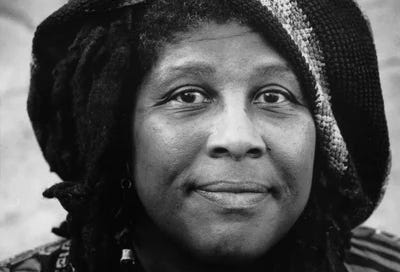High Risk can be a frustrating. The editors aren't including the writers' best work, just the work that will most fit the “provocative” and “uninhibited” labels. For some writers like Dorothy Allison, who was trying to sell Bastard Out of Carolina, or Gary Indiana, who was a toxic asswipe, the limitations are fine. For other writers, it's brutal reductionism. David Trinidad definitely had more to write about than his early fuck buddies. Essex Hemphill ends up sounding like a horny Candace Owens.
Wanda Coleman was definitely more interesting than the poems chosen by the editors. Of course, Wanda Coleman was a fascinating woman whose work can't compete with her life for drama. She married a major political activists, dumped his ass, performed in prisons and did an album with Exene Cervenka. Her Wikipedia's Controversies Section informs us that she gave Maya Angelou book a bad review. Even after she died, her archives went on a journey as her husband put all her papers in storage, and died without designating an executor. The storage unit owner dumped them in the desert and years later a graduate student found them.
Her poems are jazz and blues inspired, invoking the images of living in the city. Punctuation is optional and capitalization is non-existent. The words jumble out in an order that invokes emotion more than order. For example, American Sonnet 51 includes the lines
in my last incarnation, I inoculated myself
with oodles of dago red and stumbled into fame
without falling. I worshiped in the tempe of Lady Day
and took Coltrane as my wizard I always wore my mink coat
to the Laundromat and drank pale champagne with my
soft-boiled eggs. I believed King Kong got a raw deal.
However, her High Risk poems feel like relics of a time when spelling America as Amerikka was cool because it could anger Republicans. Other lines like “everybody wanna do the horizontal bop” are stolen from Bob Seger. Two poems are written for Austin Straus, her husband who died without getting her archives to a university. According to his obituaries, his greatest achievement was marrying Anne Moody.
So that's fun.
Both love poems convey how much she wants to fuck him. The second one “what I know of my man” she only writes about fucking. She knows “how his dickead tears in worship” and it goes on like that. The first poem is more interesting since it's not just about sex but also about the doubts that go into starting a new relationship. It's a love poem written with the cynicism of someone who has been burned before. He makes her break out in a rash, but they are both poor and she has kids. Either way he's better than
abstention & loneliness
lesbianism
the church
asexuality
intimacy with pets
opium
suicide
or staying wed to my
present monster.
She also calls him a “jewish frog with warts” and goes on with that metaphor to the point that it feels insulting.
The other two poems are about women in pain. The poem 'black madonna” is about black women getting blamed for their children, to the point that it feels like a mammy stereotype. Still it has a brilliantly disturbing ending.
legions of her children tear at her breasts and partake of her flesh. they slit her consciousness that may never sleep. she of the night of nights. she conceived without vaginal birth/without woman. unclean. she — the victim of victims.
father, the crucifixion did not take
“Death 213” is the most powerful poem, depicting a lonely woman committing suicide with a gas stove. Coleman expresses her subject's solitude in devastating ways -
no blood pools. no semen spills
no rape no murder no needle
this time there’s no chance of schematic mishap/discovery
by friends (nobody evah drops by ‘ceptin’ strays sniffin’ for pussy)
After a line about a last meal of bile and Sartre, Coleman tells us that unlike other times, there will be no savior. She's telling us that the woman's suicide was just waiting to happen, no matter how often her friends pulled her back from the edge.
Wanda Coleman was an impressive writer, but High Risk fails to respect her power. Like Hattie Gossett and Essex Hemphill, she's not just a writer. She's one of the black writers and her inclusion feels patronizing. She references her race in the context of dating a Jewish man (because Amerikka destroys her kind and makes them seek white lovers) and “black madonna” definitely has a raging racial undertone, but there's that expectation. At least the editors didn't choose poems that make her sound like a black conservative as they did with Essex Hemphill, but three of the poems push the oversexed black woman trope and that still feels unsettling in context.
Again, I feel like I would enjoy her work much better if it was in her own collection or an anthology of black poets. In High Risk, the tokenism is disturbing and obvious.
Like Wanda Coleman, I am a poor writer seeking better income so if you like my articles, please consider getting a paid subscription, donating to my gofundme or hiring me to write/edit whatever you need (resumes, papers, articles, etc). at omanlieder@yahoo.com or
Here’s an article about what happened to her papers after her husband died. They were lost, found and then ended up in the NYPL archives, with the help of actress Amber Tablyn. Read it. It’s a great story.
Obviously, you should buy one of her books.
Finally, here’s my story about friends gathering to watch zombies fuck. Wanda might have liked it.





